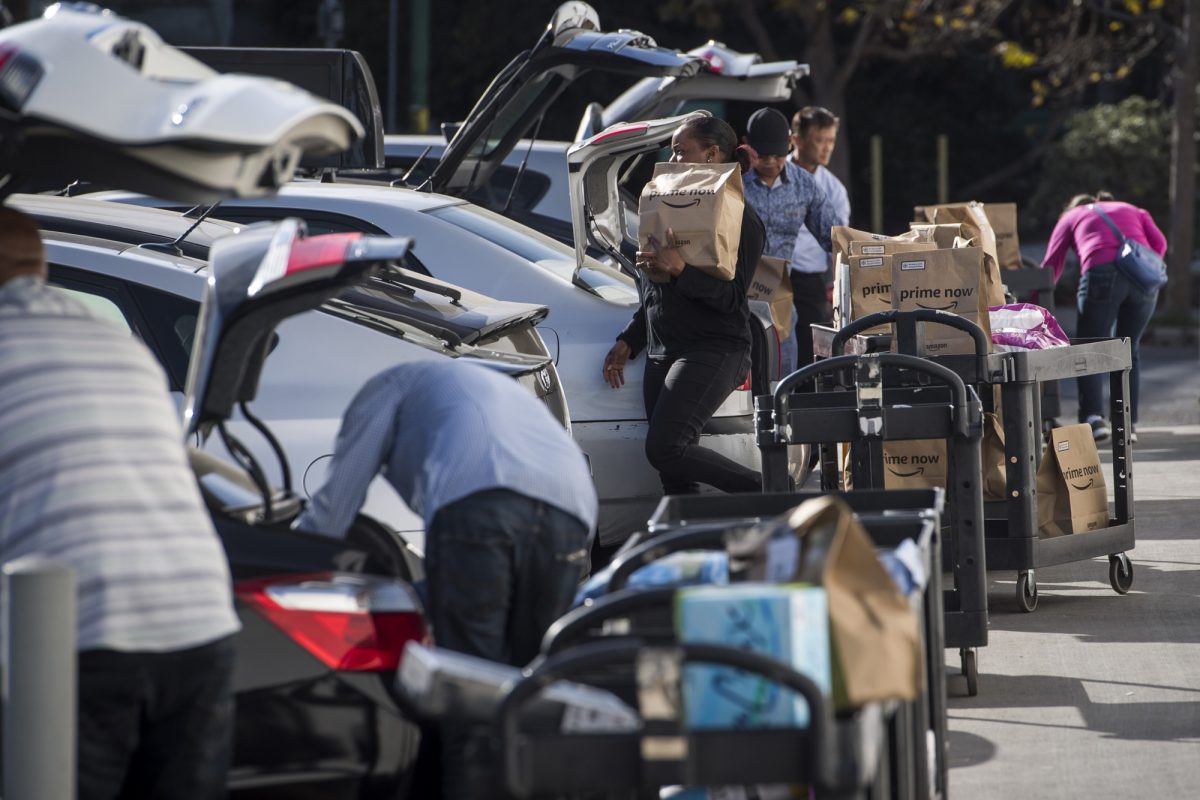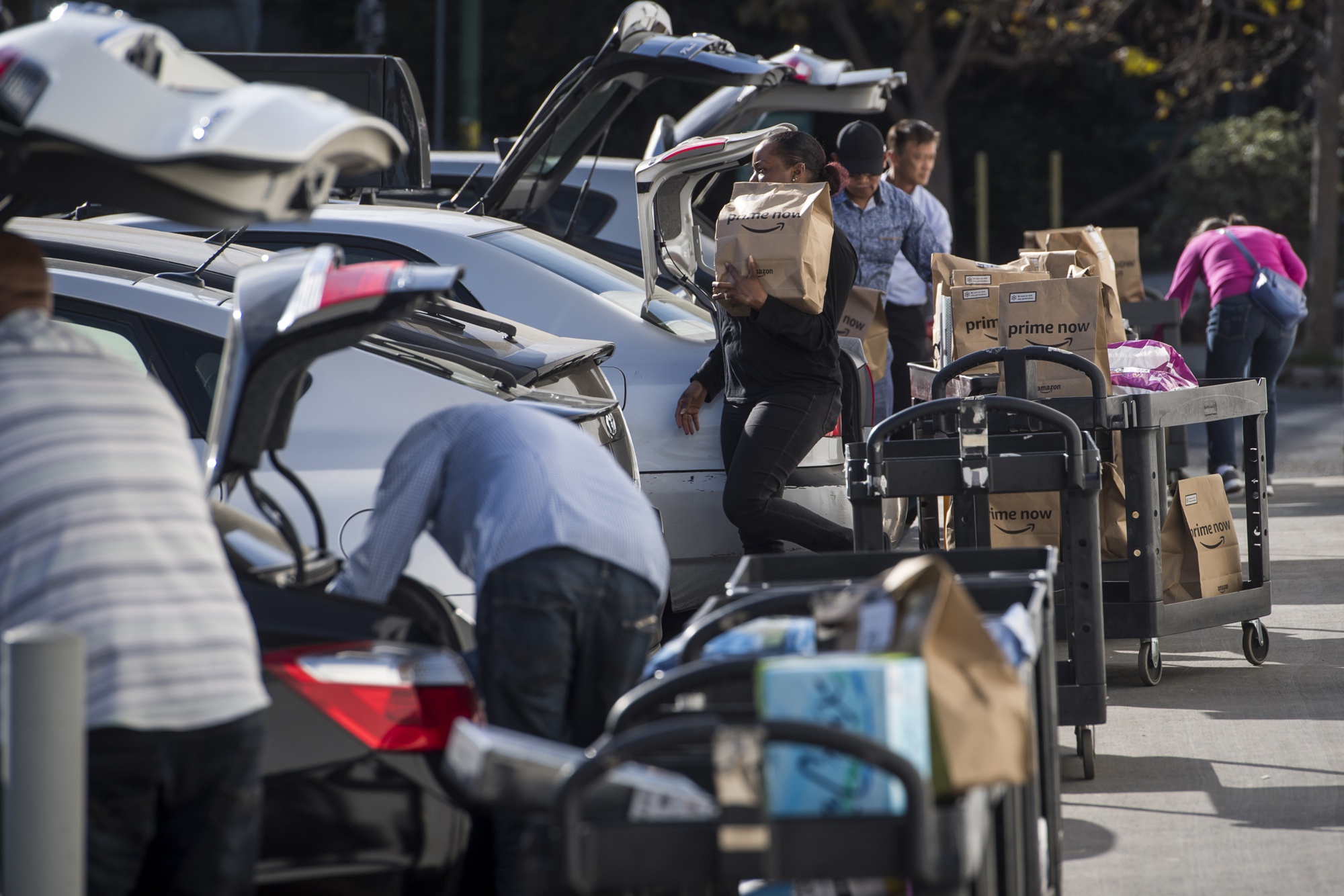The Daily Ten – Amazon Plans to Put 1,000 Warehouses in Neighborhoods

The Daily Ten
1. Amazon Plans to Put 1,000 Warehouses in Neighborhoods | Bloomberg
Seeking to compete with Walmart on same-day deliveries, the company is opening small shipping hubs in suburbs around the U.S.
Amazon.com Inc. plans to open 1,000 small delivery hubs in cities and suburbs all over the U.S., according to people familiar with the plans. The facilities, which will eventually number about 1,500, will bring products closer to customers, making shopping online about as fast as a quick run to the store. It will also help the world’s largest e-commerce company take on a resurgent Walmart Inc.
Amazon couldn’t fulfill its two-day delivery pledge earlier this year when shoppers in Covid-19 lockdown flooded the company with more orders than it could handle. While delivery times have improved thanks to the hiring of 175,000 new workers, Amazon is now consumed with honoring a pre-pandemic pledge to get many products to Prime subscribers on the same day. So with the holidays approaching, Chief Executive Officer Jeff Bezos is doubling down by investing billions in proximity, putting warehouses and swarms of blue vans in neighborhoods long populated with car dealerships, fast-food joints, shopping malls and big-box stores.
Historically, Amazon gnawed away at brick-and-mortar rivals from warehouses on the exurban fringes, where it operated mostly out of sight and out of mind. That worked fine when the company was promising to get products to customers in two days. Now Walmart and Target Corp. are using their thousands of stores to beat Amazon at its own game by offering same-day delivery of online orders. Walmart also recently started is own Prime-style subscription service, upping the competitive ante.
2. Making Offices Safe for Workers, and Making Money Doing It | WSJ
To guard against Covid-19, companies look to reshape workplace with tracking apps, touchless doors and plant-festooned dividers
Bringing employees back to work could mean big business for the designers, engineers and software companies selling products designed to boost office safety and ease workers’ worries in the pandemic.
Their solutions go well beyond plexiglass sheets and hand sanitizer. Apps to guide office traffic, sensors that detect when to call in the cleaners,…
3. Google launches Kartta Labs to recreate historical maps in 3D | Venture Beat
Google today launched Kartta Labs, an open source, scalable system on Google Cloud and Kubernetes that reconstructs what cities looked like in the past from historical maps and photos. Available as a suite of tools, Kartta creates a map with an explorable timeline, allowing users to populate dates with historically accurate information.
Kartta Labs was first introduced last year during the International Workshop on AI for Geographic Knowledge Discovery. According to the creators, the motivation is to organize the world’s historical maps while making them accessible and useful. Historical maps, which can help to identify cultural and social trends, are an invaluable resource not only for civic research but for planning and outreach. Over a decade ago, former vice president Al Gore used Google Earth historical imagery to show the melting of the polar ice caps
4. Cushman, Industrious Form Alliance as Office Industry Rallies Behind Flex Space | WSJ
As many businesses continue to craft their back-to-the-workplace strategies, flexibility for workers is a large component
Cushman & Wakefield PLC, one of the world’s largest commercial-real-estate-services firms, has launched an alliance with Industrious, a startup co-working firm, to build market share in one of the few growing office-space businesses during the pandemic.
The office industry has mostly gotten pounded this year, creating pain for investors.
5. Movie Theaters Returned. Audiences Didn’t. Now What? | New York Times
People aren’t going to the movies at anywhere close to the numbers that Hollywood hoped, prompting studios to postpone more big releases. Marvel’s “Black Widow” could be the next to retreat.
LOS ANGELES — “Tenet” was supposed to mark the return of the movie theater business in the United States. Instead, it has shown just how much trouble the industry is in.
After five months of pandemic-forced closure, the big movie theater chains reopened in roughly 68 percent of the United States by Labor Day weekend, in large part so they could show the $200 million film, which Warner Bros. promoted as “a global tent pole of jaw-dropping size, scope and scale.” But “Tenet,” directed by the box office heavyweight Christopher Nolan, instead arrived with a whimper: It collected $9.4 million in its first weekend in North America and just $29.5 million over its first two weeks.
Theaters remain closed in New York and Los Angeles, the two biggest markets in the United States and the center of Mr. Nolan’s fan base. In the areas where “Tenet” did play, audience concern about safety — even with theater capacity limited to 50 percent or less in most locations — likely hurt ticket sales. Box office analysts also noted that “Tenet” is a complicated, cerebral movie with little star power; a frothier, more escapist offering may have had an easier time coaxing people back to cinemas.
6. JPMorgan Sends Some Traders Home After Worker Gets Covid-19 | Bloomberg
JPMorgan Chase & Co. sent some of its Manhattan workers home this week after an employee in equities trading tested positive for Covid-19, according to a person with knowledge of the matter.
News of the infection, on the fifth floor of the company’s 383 Madison Ave. building, was communicated to employees on Sept. 13, said the person, who asked not to be identified discussing information that isn’t public.
That was less than a week after more workers began returning to offices following the Labor Day holiday, and just days after the biggest U.S. bank told senior traders they’d be required to return by Sept. 21.
The case shows the challenges banks face as they try to bring more staff back to the office after months of remote work. JPMorgan has been among the boldest banks in calling workers back, and Chief Executive Officer Jamie Dimon spoke earlier Tuesday about his concerns that extended work-from-home could have its own consequences.
A JPMorgan spokesman said he couldn’t comment on any one case but that the bank has been “managing individual cases across the firm over the course of the last few months and following appropriate protocols when they occur.”
The infection is something of a deja vu for the bank. In April, there was an outbreak on the same floor inside JPMorgan’s temporary headquarters on Madison Avenue, with at least 16 people testing positive on a single trading floor.
7. The Chainsmokers just closed their debut venture fund, Mantis, with $35 million | TechCrunch
Alex Pall and Drew Taggart are best known as The Chainsmokers, an electronic DJ and production duo whose first three albums have given rise to numerous Billboard chart-topping songs, four Grammy nominations and one Grammy award, for the song “Don’t Let Me Down.”
Soon, they hope they’ll be known as savvy venture investors, too.
They already have some major-league believers, including investors Mark Cuban, Keith Rabois, Jim Coulter and Ron Conway, who are among the other individuals who provided the Chainsmokers’s new early-stage venture firm, Mantis, with $35 million in capital commitments for its debut fund.
It’s a surprisingly traditional vehicle in many ways. Mantis is being managed day-to-day by two general partners who respectively offer venture and operational experience: Milan Koch graduated in 2012 from UCLA and has been an investor ever since, including as a venture partner with the seed-stage fund Base Ventures; Jeffrey Evans founded the record label Buskin Records and the mobile communications platform TigerText (now TigerConnect), among other companies, and has long known the Chainsmokers’s business manager, Josh Klein.
8. Defense Innovation Board: The Pentagon should hire remote workers who can handle classified info | Venture Beat
The Defense Innovation Board (DIB) today recommended that the Pentagon open its hiring practices up to civilians working from home who can handle classified information. DIB members suggested the change in policy as a way to attract tech talent working remotely in the age of COVID-19.
In a virtual meeting today, DIB members shared five recommendations for Defense Secretary Mark Esper and the Pentagon on how to attract and retain civilian workers with specialized skills in digital technologies. Another recommendation: Create a nationwide network of Sensitive Compartmented Information Facilities, or SCIFs, for remote workers to review classified information near their homes.
“So for remote staff can you access them? Can you have a hotel in them? I think we talked about this idea of a WeWork for SCIFs,” said DIB member Jennifer Pahlka.
Since the start of the COVID-19 pandemic, major tech companies like Facebook and Google are telling employees they can work from home until summer 2021, and some chose to become semi-remote or permanently remote businesses. Pahlka said the military must change too in order to remain competitive with private businesses competing for the same talent.
9. Over 1,000 parents sign open letter protesting facial recognition in schools | Venture Beat
This morning, Fight For the Future, a nonprofit advocacy group promoting causes related to privacy, censorship, and copyright legislation, published a letter calling for a ban on facial recognition in U.S. schools that gained 1,000 signatures from parents in 50 states in less than a week. The open letter, which is addressed to lawmakers and school administrators around the country, highlights the dangers of surveillance and risks associated with data compromise as well as the ways facial recognition might exacerbate discrimination against particular students.
Fight For the Future’s campaign comes as an increasing number of schools consider deploying facial recognition tech to combat the coronavirus pandemic. Fayette County Public Schools in Georgia recently purchased cameras made by Hikvision, a Chinese provider of facial recognition tools and surveillance equipment, to estimate students’ temperatures as they walk in the door.
The Topeka Public School District acquired screening systems that ship with integrated facial recognition features. And in New Hampshire, the Rio Rancho Public Schools Board of Education ordered dozens of GoSafe tablets that have facial recognition components built-in.
10. Ryan Serhant Selfied, Shared and Streamed His Way to $4 Billion in Sales. Now He’s Building His Own Brokerage | WSJ
Like Mr. Serhant, a rising crop of agents are upping the ante on personal branding. But are they overshadowing the real estate?
Real-estate agent Ryan Serhant is standing with a professional film crew on the roof of one of his latest projects, a pricey condominium project on the north end of Central Park, waiting for a small aircraft to spell out the name of the building in the sky above. When the plane finally appears, he jumps into action, hamming it up for the cameras and pointing animatedly at the scrawl overhead, which reads “145 CPN.” For Mr. Serhant, who made his name as one of the stars of the reality television show “Million Dollar Listing New York,” the skywriting stunt, for which he paid around $6,000, is the latest of his outlandish


